International Baccalaureate Music Instructional Activity Report
VerifiedAdded on 2020/10/04
|10
|2115
|68
Report
AI Summary
This report presents an in-depth analysis of an International Baccalaureate (IB) music instructional activity episode designed for the Middle Years Programme. The report details the context and purpose of the instructional activity, which focuses on teaching music to students aged 13-16. It emphasizes the integration of differentiated instruction to support diverse learners, incorporating both theoretical and practical learning experiences. The report highlights the use of Bloom's Taxonomy to promote inquiry and higher-order thinking skills (HOTS), while also addressing barriers to effective instruction. Furthermore, it discusses research-informed lesson planning and provides an overall reflection on the educational outcomes of the activities. The report includes a unit plan in Appendix I and references relevant literature supporting the instructional approach. The report provides a comprehensive overview of the instructional methods used in an IB music class.
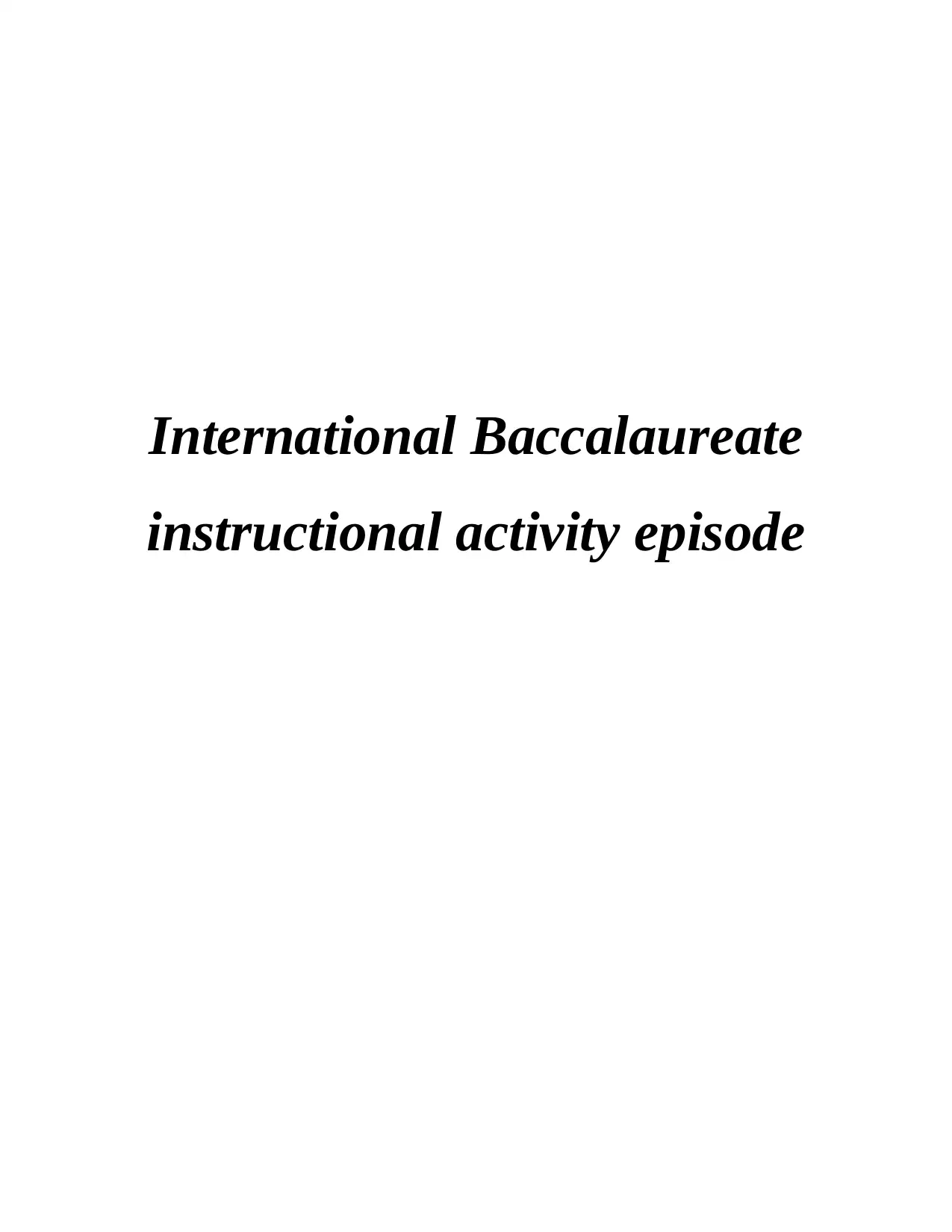
International Baccalaureate
instructional activity episode
instructional activity episode
Paraphrase This Document
Need a fresh take? Get an instant paraphrase of this document with our AI Paraphraser
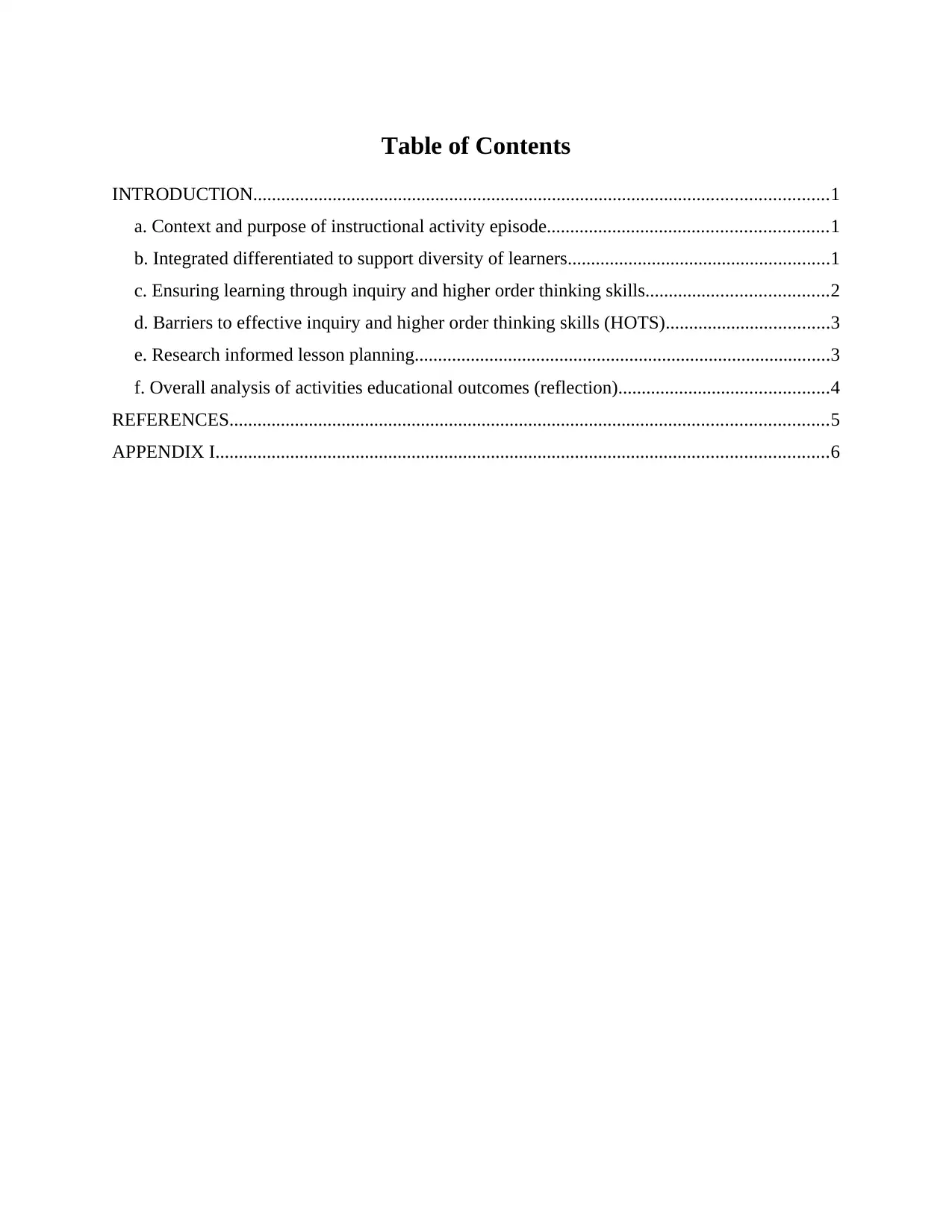
Table of Contents
INTRODUCTION...........................................................................................................................1
a. Context and purpose of instructional activity episode............................................................1
b. Integrated differentiated to support diversity of learners........................................................1
c. Ensuring learning through inquiry and higher order thinking skills.......................................2
d. Barriers to effective inquiry and higher order thinking skills (HOTS)...................................3
e. Research informed lesson planning.........................................................................................3
f. Overall analysis of activities educational outcomes (reflection).............................................4
REFERENCES................................................................................................................................5
APPENDIX I...................................................................................................................................6
INTRODUCTION...........................................................................................................................1
a. Context and purpose of instructional activity episode............................................................1
b. Integrated differentiated to support diversity of learners........................................................1
c. Ensuring learning through inquiry and higher order thinking skills.......................................2
d. Barriers to effective inquiry and higher order thinking skills (HOTS)...................................3
e. Research informed lesson planning.........................................................................................3
f. Overall analysis of activities educational outcomes (reflection).............................................4
REFERENCES................................................................................................................................5
APPENDIX I...................................................................................................................................6
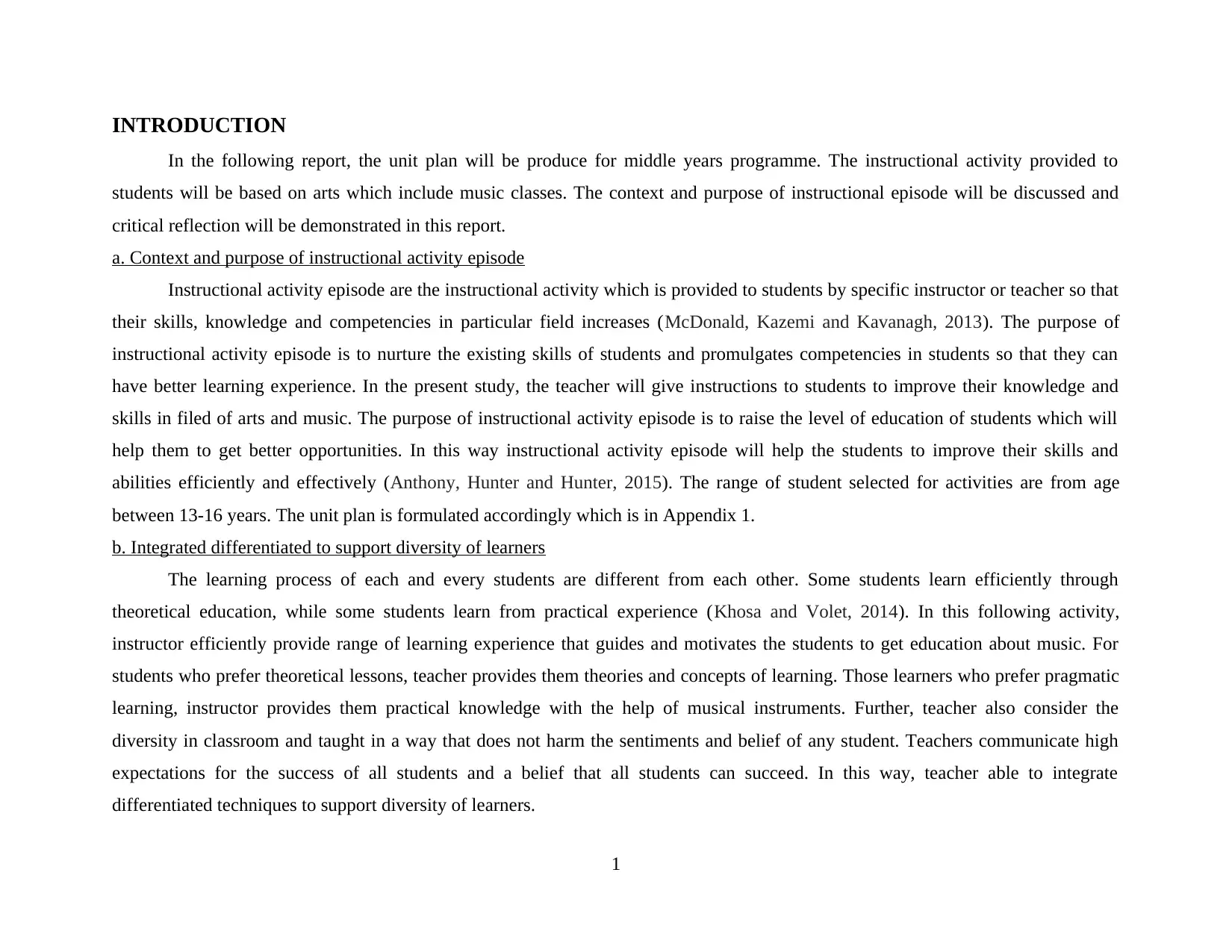
INTRODUCTION
In the following report, the unit plan will be produce for middle years programme. The instructional activity provided to
students will be based on arts which include music classes. The context and purpose of instructional episode will be discussed and
critical reflection will be demonstrated in this report.
a. Context and purpose of instructional activity episode
Instructional activity episode are the instructional activity which is provided to students by specific instructor or teacher so that
their skills, knowledge and competencies in particular field increases (McDonald, Kazemi and Kavanagh, 2013). The purpose of
instructional activity episode is to nurture the existing skills of students and promulgates competencies in students so that they can
have better learning experience. In the present study, the teacher will give instructions to students to improve their knowledge and
skills in filed of arts and music. The purpose of instructional activity episode is to raise the level of education of students which will
help them to get better opportunities. In this way instructional activity episode will help the students to improve their skills and
abilities efficiently and effectively (Anthony, Hunter and Hunter, 2015). The range of student selected for activities are from age
between 13-16 years. The unit plan is formulated accordingly which is in Appendix 1.
b. Integrated differentiated to support diversity of learners
The learning process of each and every students are different from each other. Some students learn efficiently through
theoretical education, while some students learn from practical experience (Khosa and Volet, 2014). In this following activity,
instructor efficiently provide range of learning experience that guides and motivates the students to get education about music. For
students who prefer theoretical lessons, teacher provides them theories and concepts of learning. Those learners who prefer pragmatic
learning, instructor provides them practical knowledge with the help of musical instruments. Further, teacher also consider the
diversity in classroom and taught in a way that does not harm the sentiments and belief of any student. Teachers communicate high
expectations for the success of all students and a belief that all students can succeed. In this way, teacher able to integrate
differentiated techniques to support diversity of learners.
1
In the following report, the unit plan will be produce for middle years programme. The instructional activity provided to
students will be based on arts which include music classes. The context and purpose of instructional episode will be discussed and
critical reflection will be demonstrated in this report.
a. Context and purpose of instructional activity episode
Instructional activity episode are the instructional activity which is provided to students by specific instructor or teacher so that
their skills, knowledge and competencies in particular field increases (McDonald, Kazemi and Kavanagh, 2013). The purpose of
instructional activity episode is to nurture the existing skills of students and promulgates competencies in students so that they can
have better learning experience. In the present study, the teacher will give instructions to students to improve their knowledge and
skills in filed of arts and music. The purpose of instructional activity episode is to raise the level of education of students which will
help them to get better opportunities. In this way instructional activity episode will help the students to improve their skills and
abilities efficiently and effectively (Anthony, Hunter and Hunter, 2015). The range of student selected for activities are from age
between 13-16 years. The unit plan is formulated accordingly which is in Appendix 1.
b. Integrated differentiated to support diversity of learners
The learning process of each and every students are different from each other. Some students learn efficiently through
theoretical education, while some students learn from practical experience (Khosa and Volet, 2014). In this following activity,
instructor efficiently provide range of learning experience that guides and motivates the students to get education about music. For
students who prefer theoretical lessons, teacher provides them theories and concepts of learning. Those learners who prefer pragmatic
learning, instructor provides them practical knowledge with the help of musical instruments. Further, teacher also consider the
diversity in classroom and taught in a way that does not harm the sentiments and belief of any student. Teachers communicate high
expectations for the success of all students and a belief that all students can succeed. In this way, teacher able to integrate
differentiated techniques to support diversity of learners.
1
⊘ This is a preview!⊘
Do you want full access?
Subscribe today to unlock all pages.

Trusted by 1+ million students worldwide
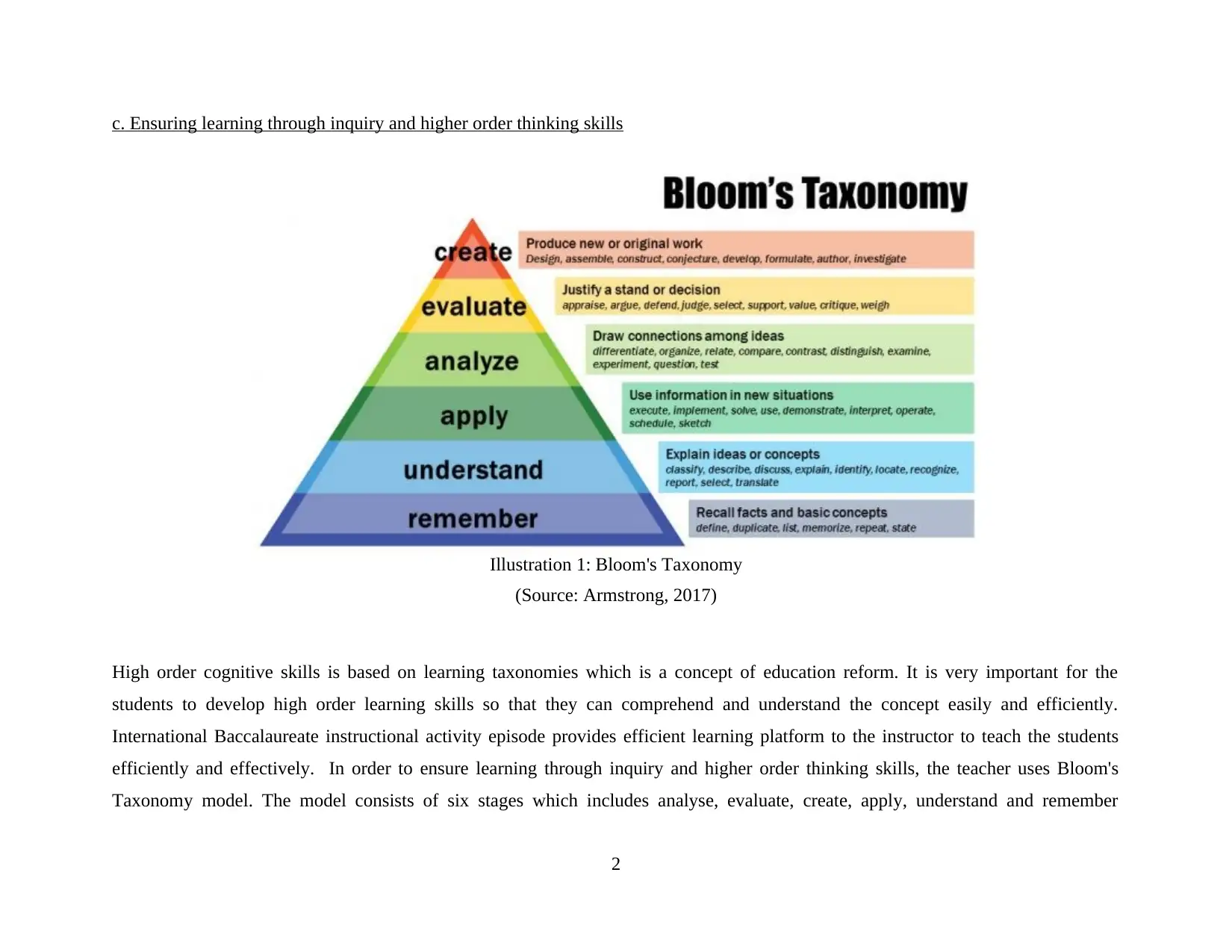
c. Ensuring learning through inquiry and higher order thinking skills
High order cognitive skills is based on learning taxonomies which is a concept of education reform. It is very important for the
students to develop high order learning skills so that they can comprehend and understand the concept easily and efficiently.
International Baccalaureate instructional activity episode provides efficient learning platform to the instructor to teach the students
efficiently and effectively. In order to ensure learning through inquiry and higher order thinking skills, the teacher uses Bloom's
Taxonomy model. The model consists of six stages which includes analyse, evaluate, create, apply, understand and remember
2
Illustration 1: Bloom's Taxonomy
(Source: Armstrong, 2017)
High order cognitive skills is based on learning taxonomies which is a concept of education reform. It is very important for the
students to develop high order learning skills so that they can comprehend and understand the concept easily and efficiently.
International Baccalaureate instructional activity episode provides efficient learning platform to the instructor to teach the students
efficiently and effectively. In order to ensure learning through inquiry and higher order thinking skills, the teacher uses Bloom's
Taxonomy model. The model consists of six stages which includes analyse, evaluate, create, apply, understand and remember
2
Illustration 1: Bloom's Taxonomy
(Source: Armstrong, 2017)
Paraphrase This Document
Need a fresh take? Get an instant paraphrase of this document with our AI Paraphraser
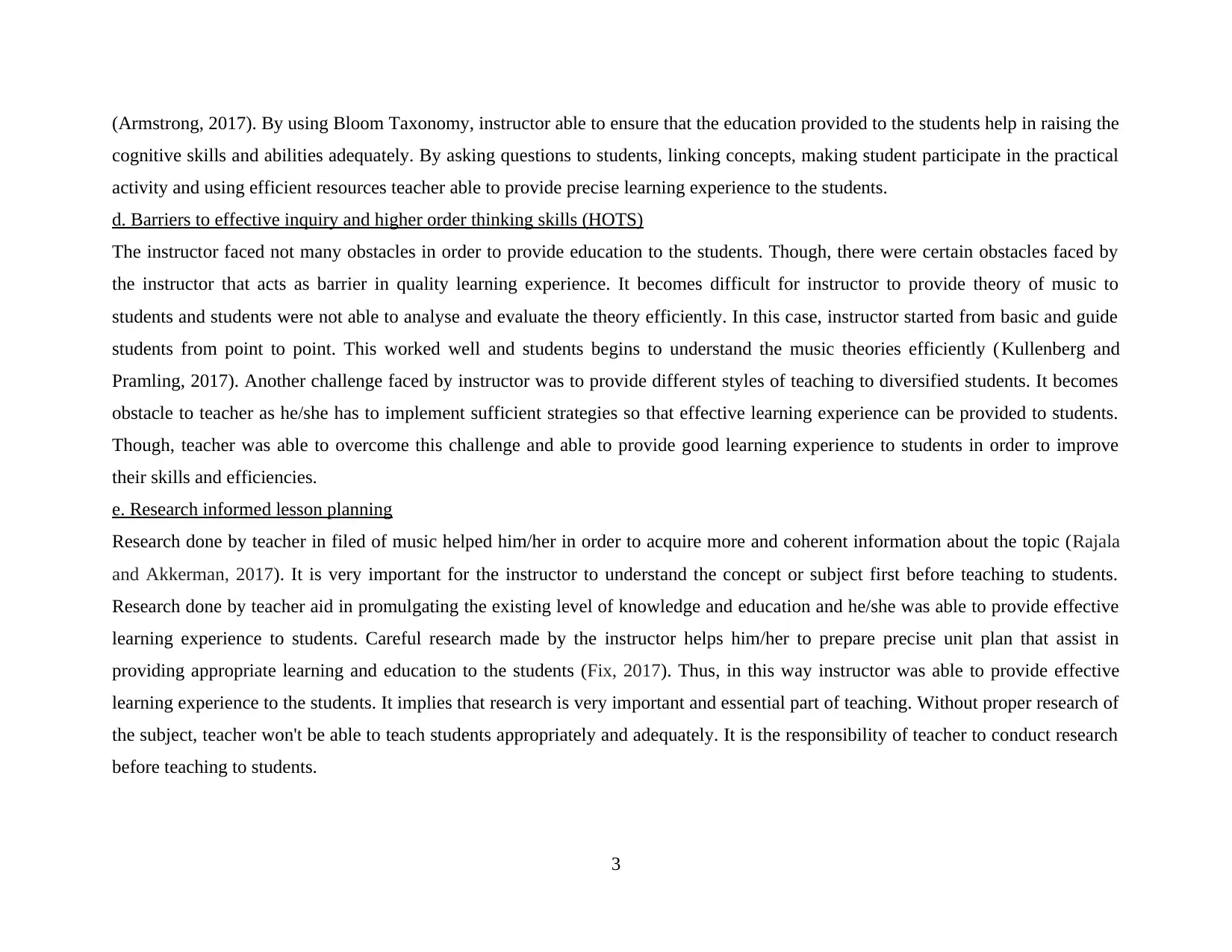
(Armstrong, 2017). By using Bloom Taxonomy, instructor able to ensure that the education provided to the students help in raising the
cognitive skills and abilities adequately. By asking questions to students, linking concepts, making student participate in the practical
activity and using efficient resources teacher able to provide precise learning experience to the students.
d. Barriers to effective inquiry and higher order thinking skills (HOTS)
The instructor faced not many obstacles in order to provide education to the students. Though, there were certain obstacles faced by
the instructor that acts as barrier in quality learning experience. It becomes difficult for instructor to provide theory of music to
students and students were not able to analyse and evaluate the theory efficiently. In this case, instructor started from basic and guide
students from point to point. This worked well and students begins to understand the music theories efficiently ( Kullenberg and
Pramling, 2017). Another challenge faced by instructor was to provide different styles of teaching to diversified students. It becomes
obstacle to teacher as he/she has to implement sufficient strategies so that effective learning experience can be provided to students.
Though, teacher was able to overcome this challenge and able to provide good learning experience to students in order to improve
their skills and efficiencies.
e. Research informed lesson planning
Research done by teacher in filed of music helped him/her in order to acquire more and coherent information about the topic (Rajala
and Akkerman, 2017). It is very important for the instructor to understand the concept or subject first before teaching to students.
Research done by teacher aid in promulgating the existing level of knowledge and education and he/she was able to provide effective
learning experience to students. Careful research made by the instructor helps him/her to prepare precise unit plan that assist in
providing appropriate learning and education to the students (Fix, 2017). Thus, in this way instructor was able to provide effective
learning experience to the students. It implies that research is very important and essential part of teaching. Without proper research of
the subject, teacher won't be able to teach students appropriately and adequately. It is the responsibility of teacher to conduct research
before teaching to students.
3
cognitive skills and abilities adequately. By asking questions to students, linking concepts, making student participate in the practical
activity and using efficient resources teacher able to provide precise learning experience to the students.
d. Barriers to effective inquiry and higher order thinking skills (HOTS)
The instructor faced not many obstacles in order to provide education to the students. Though, there were certain obstacles faced by
the instructor that acts as barrier in quality learning experience. It becomes difficult for instructor to provide theory of music to
students and students were not able to analyse and evaluate the theory efficiently. In this case, instructor started from basic and guide
students from point to point. This worked well and students begins to understand the music theories efficiently ( Kullenberg and
Pramling, 2017). Another challenge faced by instructor was to provide different styles of teaching to diversified students. It becomes
obstacle to teacher as he/she has to implement sufficient strategies so that effective learning experience can be provided to students.
Though, teacher was able to overcome this challenge and able to provide good learning experience to students in order to improve
their skills and efficiencies.
e. Research informed lesson planning
Research done by teacher in filed of music helped him/her in order to acquire more and coherent information about the topic (Rajala
and Akkerman, 2017). It is very important for the instructor to understand the concept or subject first before teaching to students.
Research done by teacher aid in promulgating the existing level of knowledge and education and he/she was able to provide effective
learning experience to students. Careful research made by the instructor helps him/her to prepare precise unit plan that assist in
providing appropriate learning and education to the students (Fix, 2017). Thus, in this way instructor was able to provide effective
learning experience to the students. It implies that research is very important and essential part of teaching. Without proper research of
the subject, teacher won't be able to teach students appropriately and adequately. It is the responsibility of teacher to conduct research
before teaching to students.
3
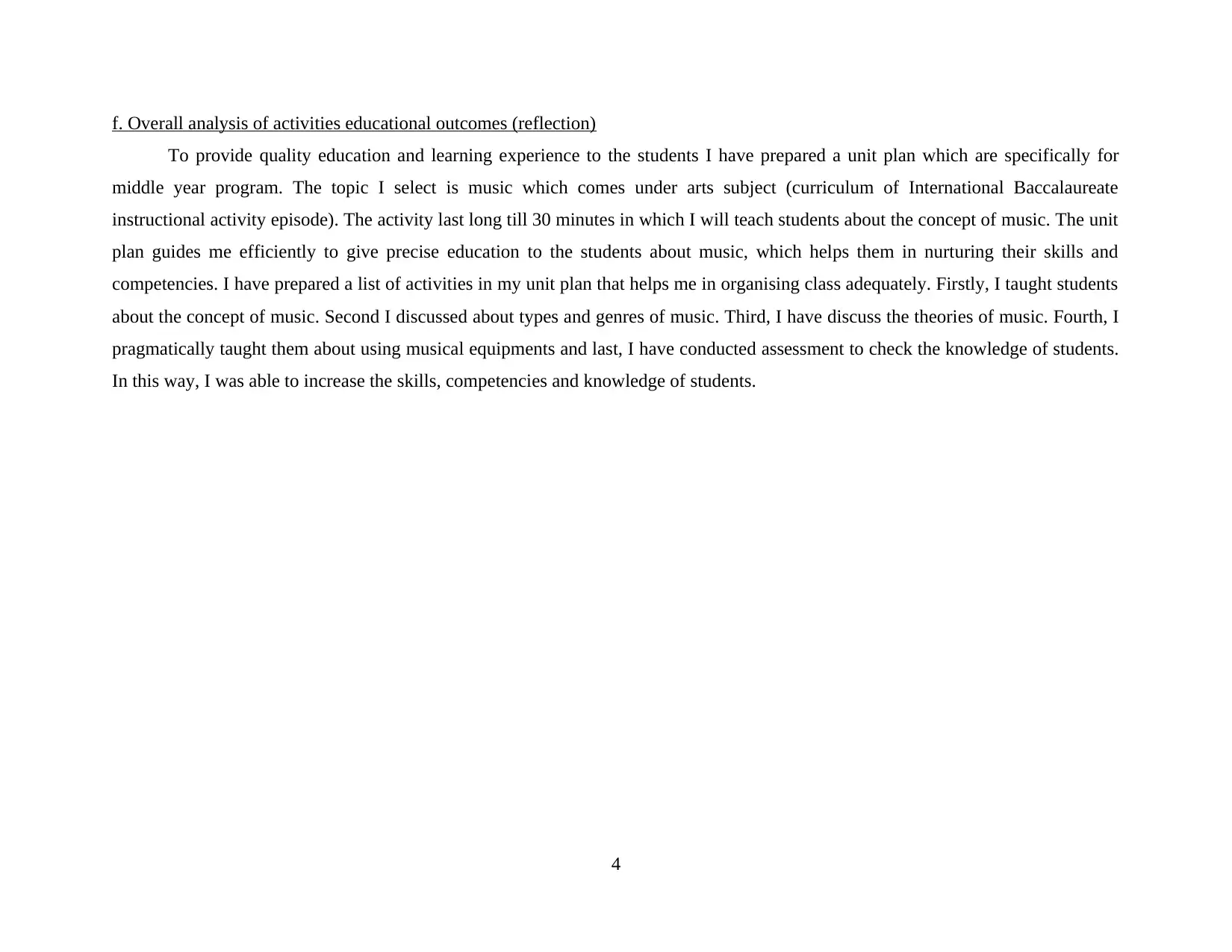
f. Overall analysis of activities educational outcomes (reflection)
To provide quality education and learning experience to the students I have prepared a unit plan which are specifically for
middle year program. The topic I select is music which comes under arts subject (curriculum of International Baccalaureate
instructional activity episode). The activity last long till 30 minutes in which I will teach students about the concept of music. The unit
plan guides me efficiently to give precise education to the students about music, which helps them in nurturing their skills and
competencies. I have prepared a list of activities in my unit plan that helps me in organising class adequately. Firstly, I taught students
about the concept of music. Second I discussed about types and genres of music. Third, I have discuss the theories of music. Fourth, I
pragmatically taught them about using musical equipments and last, I have conducted assessment to check the knowledge of students.
In this way, I was able to increase the skills, competencies and knowledge of students.
4
To provide quality education and learning experience to the students I have prepared a unit plan which are specifically for
middle year program. The topic I select is music which comes under arts subject (curriculum of International Baccalaureate
instructional activity episode). The activity last long till 30 minutes in which I will teach students about the concept of music. The unit
plan guides me efficiently to give precise education to the students about music, which helps them in nurturing their skills and
competencies. I have prepared a list of activities in my unit plan that helps me in organising class adequately. Firstly, I taught students
about the concept of music. Second I discussed about types and genres of music. Third, I have discuss the theories of music. Fourth, I
pragmatically taught them about using musical equipments and last, I have conducted assessment to check the knowledge of students.
In this way, I was able to increase the skills, competencies and knowledge of students.
4
⊘ This is a preview!⊘
Do you want full access?
Subscribe today to unlock all pages.

Trusted by 1+ million students worldwide
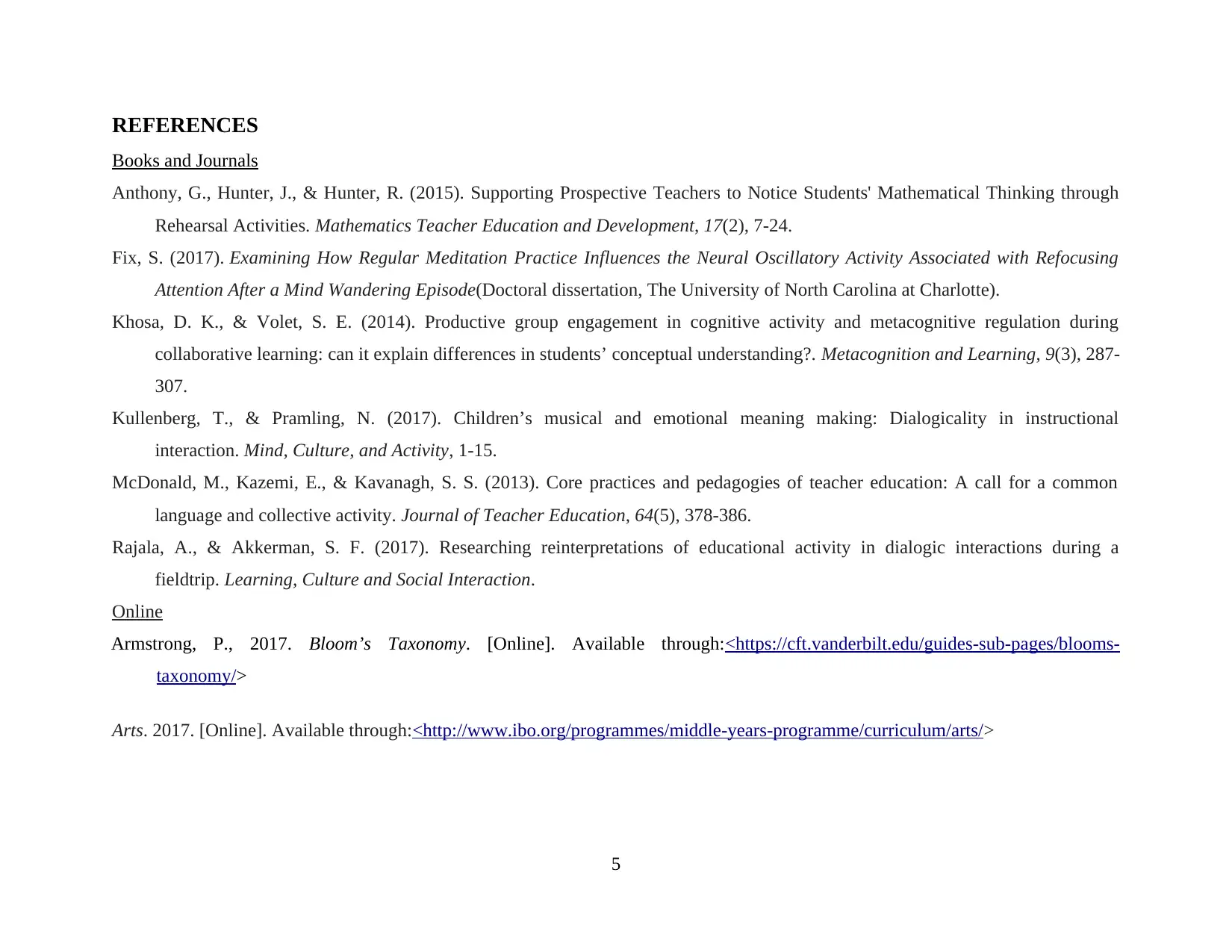
REFERENCES
Books and Journals
Anthony, G., Hunter, J., & Hunter, R. (2015). Supporting Prospective Teachers to Notice Students' Mathematical Thinking through
Rehearsal Activities. Mathematics Teacher Education and Development, 17(2), 7-24.
Fix, S. (2017). Examining How Regular Meditation Practice Influences the Neural Oscillatory Activity Associated with Refocusing
Attention After a Mind Wandering Episode(Doctoral dissertation, The University of North Carolina at Charlotte).
Khosa, D. K., & Volet, S. E. (2014). Productive group engagement in cognitive activity and metacognitive regulation during
collaborative learning: can it explain differences in students’ conceptual understanding?. Metacognition and Learning, 9(3), 287-
307.
Kullenberg, T., & Pramling, N. (2017). Children’s musical and emotional meaning making: Dialogicality in instructional
interaction. Mind, Culture, and Activity, 1-15.
McDonald, M., Kazemi, E., & Kavanagh, S. S. (2013). Core practices and pedagogies of teacher education: A call for a common
language and collective activity. Journal of Teacher Education, 64(5), 378-386.
Rajala, A., & Akkerman, S. F. (2017). Researching reinterpretations of educational activity in dialogic interactions during a
fieldtrip. Learning, Culture and Social Interaction.
Online
Armstrong, P., 2017. Bloom’s Taxonomy. [Online]. Available through:<https://cft.vanderbilt.edu/guides-sub-pages/blooms-
taxonomy/>
Arts. 2017. [Online]. Available through:<http://www.ibo.org/programmes/middle-years-programme/curriculum/arts/>
5
Books and Journals
Anthony, G., Hunter, J., & Hunter, R. (2015). Supporting Prospective Teachers to Notice Students' Mathematical Thinking through
Rehearsal Activities. Mathematics Teacher Education and Development, 17(2), 7-24.
Fix, S. (2017). Examining How Regular Meditation Practice Influences the Neural Oscillatory Activity Associated with Refocusing
Attention After a Mind Wandering Episode(Doctoral dissertation, The University of North Carolina at Charlotte).
Khosa, D. K., & Volet, S. E. (2014). Productive group engagement in cognitive activity and metacognitive regulation during
collaborative learning: can it explain differences in students’ conceptual understanding?. Metacognition and Learning, 9(3), 287-
307.
Kullenberg, T., & Pramling, N. (2017). Children’s musical and emotional meaning making: Dialogicality in instructional
interaction. Mind, Culture, and Activity, 1-15.
McDonald, M., Kazemi, E., & Kavanagh, S. S. (2013). Core practices and pedagogies of teacher education: A call for a common
language and collective activity. Journal of Teacher Education, 64(5), 378-386.
Rajala, A., & Akkerman, S. F. (2017). Researching reinterpretations of educational activity in dialogic interactions during a
fieldtrip. Learning, Culture and Social Interaction.
Online
Armstrong, P., 2017. Bloom’s Taxonomy. [Online]. Available through:<https://cft.vanderbilt.edu/guides-sub-pages/blooms-
taxonomy/>
Arts. 2017. [Online]. Available through:<http://www.ibo.org/programmes/middle-years-programme/curriculum/arts/>
5
Paraphrase This Document
Need a fresh take? Get an instant paraphrase of this document with our AI Paraphraser
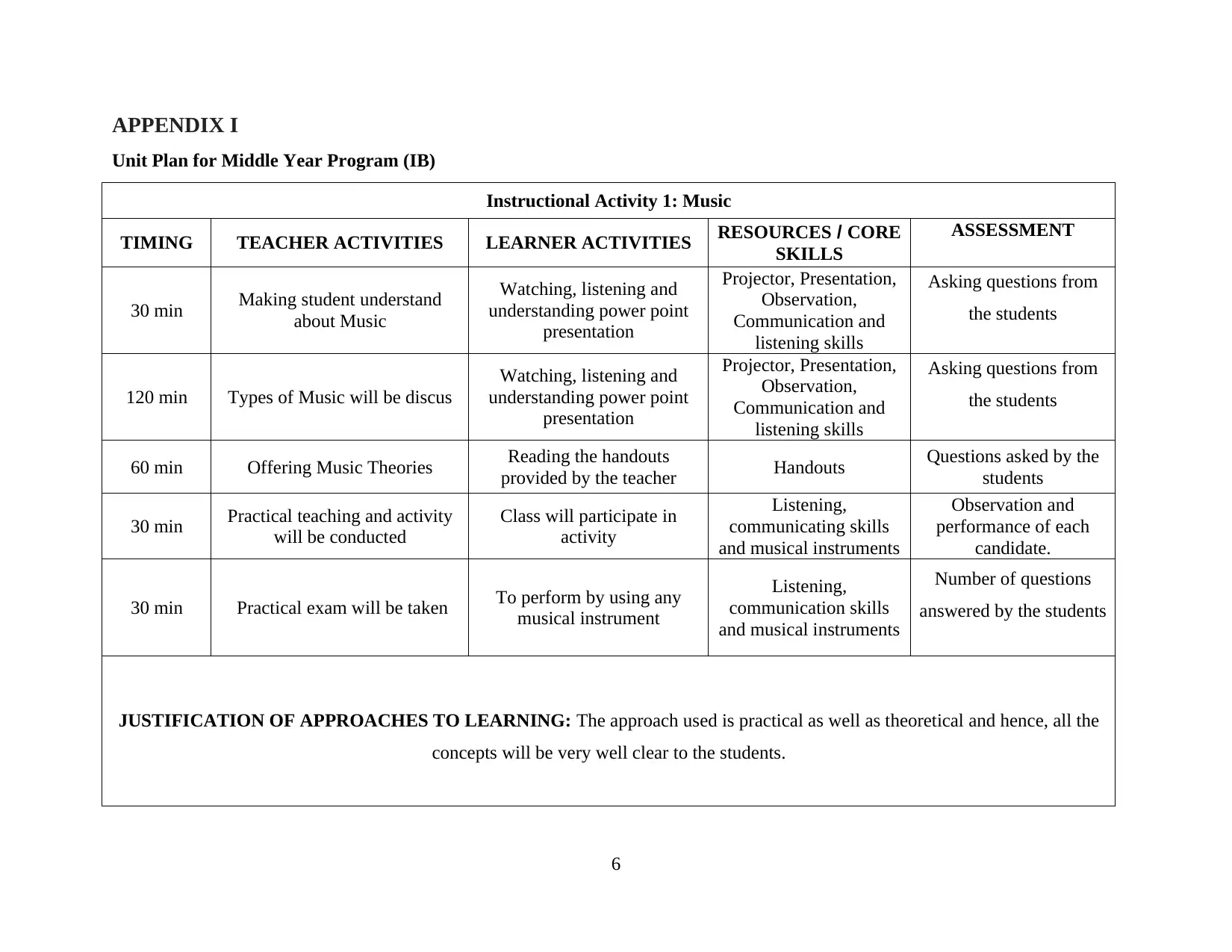
APPENDIX I
Unit Plan for Middle Year Program (IB)
Instructional Activity 1: Music
TIMING TEACHER ACTIVITIES LEARNER ACTIVITIES RESOURCES / CORE
SKILLS
ASSESSMENT
30 min Making student understand
about Music
Watching, listening and
understanding power point
presentation
Projector, Presentation,
Observation,
Communication and
listening skills
Asking questions from
the students
120 min Types of Music will be discus
Watching, listening and
understanding power point
presentation
Projector, Presentation,
Observation,
Communication and
listening skills
Asking questions from
the students
60 min Offering Music Theories Reading the handouts
provided by the teacher Handouts Questions asked by the
students
30 min Practical teaching and activity
will be conducted
Class will participate in
activity
Listening,
communicating skills
and musical instruments
Observation and
performance of each
candidate.
30 min Practical exam will be taken To perform by using any
musical instrument
Listening,
communication skills
and musical instruments
Number of questions
answered by the students
JUSTIFICATION OF APPROACHES TO LEARNING: The approach used is practical as well as theoretical and hence, all the
concepts will be very well clear to the students.
6
Unit Plan for Middle Year Program (IB)
Instructional Activity 1: Music
TIMING TEACHER ACTIVITIES LEARNER ACTIVITIES RESOURCES / CORE
SKILLS
ASSESSMENT
30 min Making student understand
about Music
Watching, listening and
understanding power point
presentation
Projector, Presentation,
Observation,
Communication and
listening skills
Asking questions from
the students
120 min Types of Music will be discus
Watching, listening and
understanding power point
presentation
Projector, Presentation,
Observation,
Communication and
listening skills
Asking questions from
the students
60 min Offering Music Theories Reading the handouts
provided by the teacher Handouts Questions asked by the
students
30 min Practical teaching and activity
will be conducted
Class will participate in
activity
Listening,
communicating skills
and musical instruments
Observation and
performance of each
candidate.
30 min Practical exam will be taken To perform by using any
musical instrument
Listening,
communication skills
and musical instruments
Number of questions
answered by the students
JUSTIFICATION OF APPROACHES TO LEARNING: The approach used is practical as well as theoretical and hence, all the
concepts will be very well clear to the students.
6
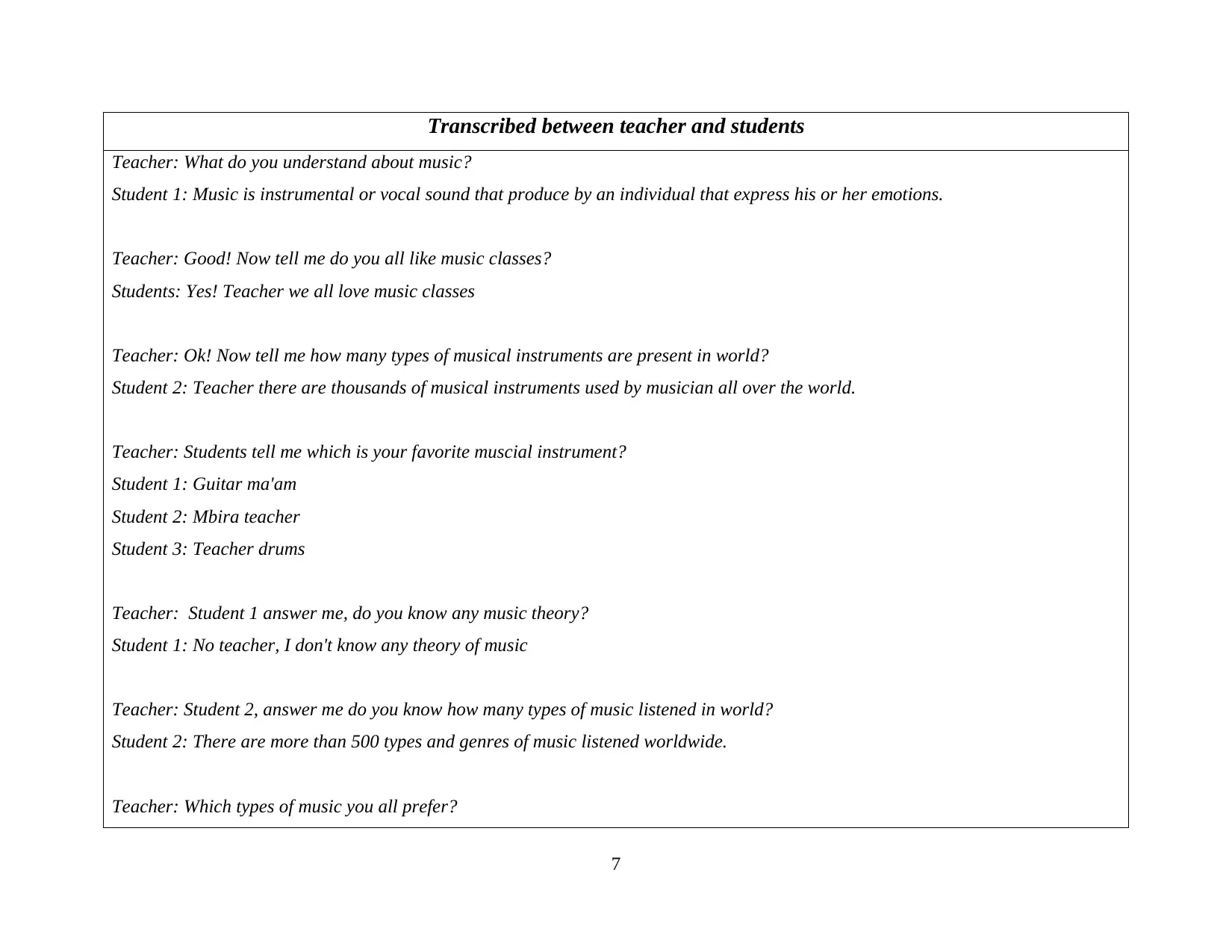
Transcribed between teacher and students
Teacher: What do you understand about music?
Student 1: Music is instrumental or vocal sound that produce by an individual that express his or her emotions.
Teacher: Good! Now tell me do you all like music classes?
Students: Yes! Teacher we all love music classes
Teacher: Ok! Now tell me how many types of musical instruments are present in world?
Student 2: Teacher there are thousands of musical instruments used by musician all over the world.
Teacher: Students tell me which is your favorite muscial instrument?
Student 1: Guitar ma'am
Student 2: Mbira teacher
Student 3: Teacher drums
Teacher: Student 1 answer me, do you know any music theory?
Student 1: No teacher, I don't know any theory of music
Teacher: Student 2, answer me do you know how many types of music listened in world?
Student 2: There are more than 500 types and genres of music listened worldwide.
Teacher: Which types of music you all prefer?
7
Teacher: What do you understand about music?
Student 1: Music is instrumental or vocal sound that produce by an individual that express his or her emotions.
Teacher: Good! Now tell me do you all like music classes?
Students: Yes! Teacher we all love music classes
Teacher: Ok! Now tell me how many types of musical instruments are present in world?
Student 2: Teacher there are thousands of musical instruments used by musician all over the world.
Teacher: Students tell me which is your favorite muscial instrument?
Student 1: Guitar ma'am
Student 2: Mbira teacher
Student 3: Teacher drums
Teacher: Student 1 answer me, do you know any music theory?
Student 1: No teacher, I don't know any theory of music
Teacher: Student 2, answer me do you know how many types of music listened in world?
Student 2: There are more than 500 types and genres of music listened worldwide.
Teacher: Which types of music you all prefer?
7
⊘ This is a preview!⊘
Do you want full access?
Subscribe today to unlock all pages.

Trusted by 1+ million students worldwide
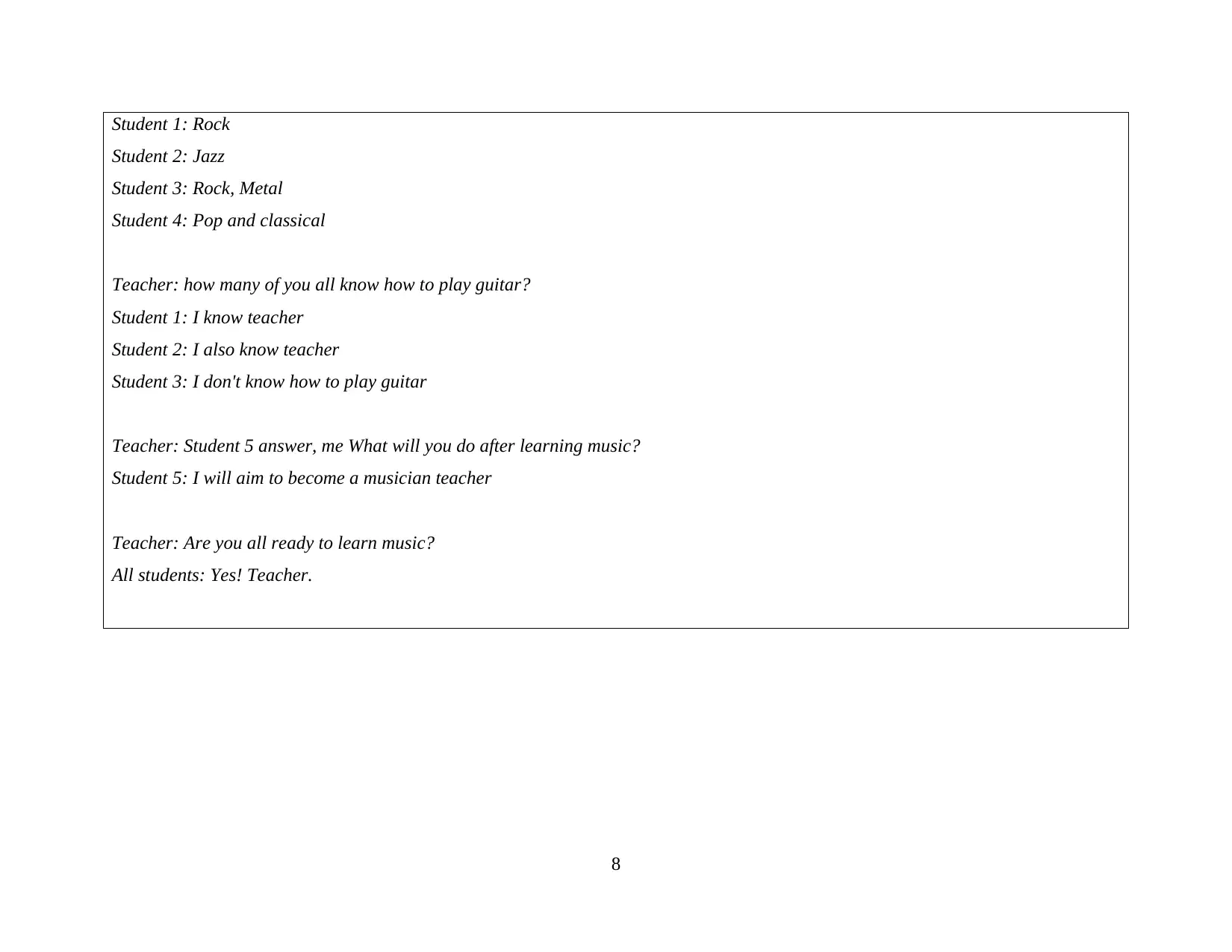
Student 1: Rock
Student 2: Jazz
Student 3: Rock, Metal
Student 4: Pop and classical
Teacher: how many of you all know how to play guitar?
Student 1: I know teacher
Student 2: I also know teacher
Student 3: I don't know how to play guitar
Teacher: Student 5 answer, me What will you do after learning music?
Student 5: I will aim to become a musician teacher
Teacher: Are you all ready to learn music?
All students: Yes! Teacher.
8
Student 2: Jazz
Student 3: Rock, Metal
Student 4: Pop and classical
Teacher: how many of you all know how to play guitar?
Student 1: I know teacher
Student 2: I also know teacher
Student 3: I don't know how to play guitar
Teacher: Student 5 answer, me What will you do after learning music?
Student 5: I will aim to become a musician teacher
Teacher: Are you all ready to learn music?
All students: Yes! Teacher.
8
1 out of 10
Related Documents
Your All-in-One AI-Powered Toolkit for Academic Success.
+13062052269
info@desklib.com
Available 24*7 on WhatsApp / Email
![[object Object]](/_next/static/media/star-bottom.7253800d.svg)
Unlock your academic potential
Copyright © 2020–2026 A2Z Services. All Rights Reserved. Developed and managed by ZUCOL.





